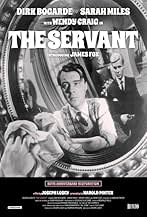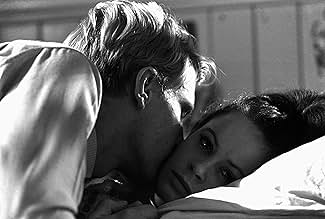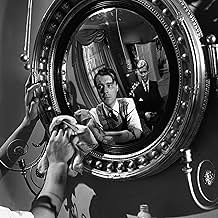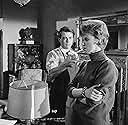The Servant
- 1963
- Tous publics
- 1h 56m
IMDb RATING
7.8/10
15K
YOUR RATING
Upper-class Tony hires servant Hugo Barrett, who turns out to have a hidden agenda.Upper-class Tony hires servant Hugo Barrett, who turns out to have a hidden agenda.Upper-class Tony hires servant Hugo Barrett, who turns out to have a hidden agenda.
- Won 3 BAFTA Awards
- 8 wins & 11 nominations total
Doris Nolan
- People in restaurant: Older Woman
- (as Doris Knox)
- Director
- Writers
- All cast & crew
- Production, box office & more at IMDbPro
Featured reviews
If you watch closely you will find that not only does the internal decoration of the house change (in ways not included in the plot) to become gradually darker as Tony is gradually undermined and seduced by Barrett but also the excellent (but very much of its time) soundtrack by Johnny Dankworth & (surely - or is my recollection wrong?) Cleo Laine - though the same LP is put on the turntable many times, the arrangement of the same theme is different. (I did not notice this at first but found it pointed out in a special issue of the Oxford University magazine Isis at the time the film was released that was entirely devoted to it.) The film has recently reappeared in England as a stage work: Play without Words, seen at the National Theatre, is (was, I guess, is more accurate) a superb piece of dance theatre in which the ambiguities of the characters' motivations, or the discrepancies between their thoughts and actions, are portrayed by having more than one dancer per character. Sometimes only one is seen, sometimes they move in unison, sometimes in separate ways. It is extremely effective.
An intimately crafted psychological drama, The Servant is a remarkable film that deserves to be seen by all. Written by Harold Pinter, based on a novel by Robin Maugham, it is a stunningly intelligent dissection of two men, the upper crust Tony (James Fox) and his new servant, Hugo Barrett (Dirk Bogarde). Through these two characters, Pinter's script unravels sharp ups and downs of class warfare and sexual games, as the two men constantly play a tug of war for power in all forms. When they first meet the two seem to hit it off quite well, falling comfortably into their positions of servant and master.
However, once Tony's fiancée Susan (Wendy Craig) comes into the mix and disapproves of Barrett, things start to become more conflicted. Then, Barrett's "sister" Vera (Sarah Miles) comes to move in and her true nature, as Barrett's lover, throws an even stronger rift between the two and their class positioning. The intrusion of these women sets off a descent from their idyllic lifestyle and the two men spend the rest of the time clashing with one another, the walls slowly closing in on this gripping and powerful study.
Director Joseph Losey makes great work of his tools here, using a lot of unique camera techniques like splitting the focus and viewing the characters through reflective surfaces rather than directly, which all serve to heighten the already high tension. The structure is bizarre and the final act gets surprisingly dark and borderline surreal, as the two engage in a series of fascinating interactions to further dissect the state of their dynamic. The Servant would be absolutely nothing without the performances of it's two men, and they both deliver in equal measures. The women are both superb as well, Craig being sharp and vicious, Miles being naive and sensual, but it's the boys show all the way through.
Bogarde is breathtaking, convincingly portraying the "gentleman's gentleman" of a butler at first but slowly turning more sinister and terrifying as time passes on. He plays all sides of this character with total life, always remaining a mystery to the audience as we are never sure whether he is fooling Tony and us or if he's being sincere at any given moment. There's a scene between him and Susan where she digs into him and the pain on his face, the emasculation, actually allows the viewer to feel deeply for what could have been a very unlikeable character.
Fox is no dull edge either, meeting Bogarde with a heartbreaking descent, falling from the mannered and composed young man we first meet into the shriveled and destroyed wreck by the end. The shifting dynamics between the two are always engaging, and Pinter embeds the film with just the right amount of emotion, comedy, terror and homoerotic subtext. It's a shattering work, marvelously performed by everyone involved.
However, once Tony's fiancée Susan (Wendy Craig) comes into the mix and disapproves of Barrett, things start to become more conflicted. Then, Barrett's "sister" Vera (Sarah Miles) comes to move in and her true nature, as Barrett's lover, throws an even stronger rift between the two and their class positioning. The intrusion of these women sets off a descent from their idyllic lifestyle and the two men spend the rest of the time clashing with one another, the walls slowly closing in on this gripping and powerful study.
Director Joseph Losey makes great work of his tools here, using a lot of unique camera techniques like splitting the focus and viewing the characters through reflective surfaces rather than directly, which all serve to heighten the already high tension. The structure is bizarre and the final act gets surprisingly dark and borderline surreal, as the two engage in a series of fascinating interactions to further dissect the state of their dynamic. The Servant would be absolutely nothing without the performances of it's two men, and they both deliver in equal measures. The women are both superb as well, Craig being sharp and vicious, Miles being naive and sensual, but it's the boys show all the way through.
Bogarde is breathtaking, convincingly portraying the "gentleman's gentleman" of a butler at first but slowly turning more sinister and terrifying as time passes on. He plays all sides of this character with total life, always remaining a mystery to the audience as we are never sure whether he is fooling Tony and us or if he's being sincere at any given moment. There's a scene between him and Susan where she digs into him and the pain on his face, the emasculation, actually allows the viewer to feel deeply for what could have been a very unlikeable character.
Fox is no dull edge either, meeting Bogarde with a heartbreaking descent, falling from the mannered and composed young man we first meet into the shriveled and destroyed wreck by the end. The shifting dynamics between the two are always engaging, and Pinter embeds the film with just the right amount of emotion, comedy, terror and homoerotic subtext. It's a shattering work, marvelously performed by everyone involved.
This is a superb, sinister movie of the very highest class. Unlike the character Tony (James Fox) who is upper class without being high class, if you get my drift. You cannot really sympathise with Tony, who toys with some high falutin' development projects but basically is a wastrel just waiting to be ponced off. Tony is a later-day Bertie Wooster. The sinister element comes from the servant (Dirk Bogarde), who is no Jeeves. Barrett, like Jeeves , is a gentleman's gentleman or valet (not a butler as suggested in some other comments on this film). Tony needs a valet because he is incapable of doing anything much without help. Barrett and his accomplice Vera (Sarah Miles) take Tony to the cleaners, sweeping aside the fiancee Susan (Wendy Craig) in their wake.
Harold Pinter has written the screenplay in similar vein to the superb movie The Accident, also a Losey piece, which I also commend. The cinematography in both movies is simply excellent. The subject matter of The Servant suits Pinter, although much of the screenplay is not really in Pinter's voice. However, there is one scene, set in a restaurant, which includes a tiny cameo by Pinter himself and which contains a short Pinteresque exchange between two women. There is also one tense exchange between Susan and Barrett "do you wear deodorant" etc. which is very reminiscent of a scene in The Caretaker "you stink from arsehole to Thursday" etc. Indeed the story of The Servant resembles The Caretaker in many respects, except that in The Servant the interloper, Barrett, is on top and stays there, whereas in The Caretaker the interloper, Davies, lacks the skill and circumstances to dislodge the incumbent.
There is a homoerotic undercurrent to the film and this works so well because it is an undercurrent (in 1963 there could have been no more than an undercurrent even if they had wanted more). The overt debauchery with Vera and the orgy party towards the end of the film is the only bit of the film that has aged without grace. But I quibble.
This is a truly great film and it deserves to be more widely known.
Harold Pinter has written the screenplay in similar vein to the superb movie The Accident, also a Losey piece, which I also commend. The cinematography in both movies is simply excellent. The subject matter of The Servant suits Pinter, although much of the screenplay is not really in Pinter's voice. However, there is one scene, set in a restaurant, which includes a tiny cameo by Pinter himself and which contains a short Pinteresque exchange between two women. There is also one tense exchange between Susan and Barrett "do you wear deodorant" etc. which is very reminiscent of a scene in The Caretaker "you stink from arsehole to Thursday" etc. Indeed the story of The Servant resembles The Caretaker in many respects, except that in The Servant the interloper, Barrett, is on top and stays there, whereas in The Caretaker the interloper, Davies, lacks the skill and circumstances to dislodge the incumbent.
There is a homoerotic undercurrent to the film and this works so well because it is an undercurrent (in 1963 there could have been no more than an undercurrent even if they had wanted more). The overt debauchery with Vera and the orgy party towards the end of the film is the only bit of the film that has aged without grace. But I quibble.
This is a truly great film and it deserves to be more widely known.
While this little known British classic has been badly neglected for the last thirty years or so, it shouldn't be; it is one of the most expertly realized portraits of British class warfare ever. Aside from Bogarde's (obviously) letter perfect portrayal of a sinister lower class valet with some ugly designs on his upper crust victim (well played also, by James Fox, who came to specialize in similar roles), one scene in particular stands out, and underlines beautifully the whole film's entire message. When Fox's aristocratic girlfriend (played by Wendy Craig) comes to visit, she has an amazing encounter with Bogarde. She suspects he's moving in on her boyfriend, ready to replace her in his affections. She imperiously orders him into the front room, abruptly quizzing him for his opinions on just about everything. She isn't concerned with his answers-she just enjoys ordering him around, Queen Victoria style. The effect is stunning-Bogarde clearly wants to strangle the bitch, but must restrain himself, he's only the servant after all. But he's still a man, and will get his revenge soon enough. The whole upper class system will be turned on its head. The resolution (if it can be called that) is not totally satisfying. In fact, it seems just as confused just and messy as life itself is.
Some reviewers have stated that Ms. Craig was miscast as the classy girlfriend. Not so-as she imperiously and hatefully orders the helpless servant around, her face and voice become a hateful mask of the arrogance and cruelty of British snobbery. A minor classic of its kind, somewhat dated, but still relevant and brilliantly filmed in moody black and white, and Bogarde's best moments on film.
Some reviewers have stated that Ms. Craig was miscast as the classy girlfriend. Not so-as she imperiously and hatefully orders the helpless servant around, her face and voice become a hateful mask of the arrogance and cruelty of British snobbery. A minor classic of its kind, somewhat dated, but still relevant and brilliantly filmed in moody black and white, and Bogarde's best moments on film.
I first watched Losey's most famous work - but not quite his best, in my opinion - on the big-screen at London's National Film Theatre in 1999, just a few months after star Dirk Bogarde's death; it's certainly one of the latter's most significant roles (along with the homosexual composer of DEATH IN VENICE [1971], perhaps his most representative), though I still feel that VICTIM (1961) is the finest film he's ever been associated with!
Even so, Bogarde's performance (recipient of the BAFTA award) is understated most of the time - which rather suits his enigmatic title character, a self-described "gentleman's gentleman" but actually harboring sinister ambitions. Interestingly, when Joseph Losey fell ill in mid-production, the directorial chores were thrust into the hands of the leading man until his recovery - who, amusingly, initially turned Losey down by saying that he "couldn't direct a bus" if his life depended on it!
While he was still some years away from the deliberate formalism that virtually characterized all his later output, Losey's style is here more controlled - for lack of a better word - than in, say, THE CRIMINAL (1960) or EVA (1962); this may have been due to the 'failure' of the latter (see my review elsewhere), or perhaps his collaboration with screenwriter (and influential playwright) Harold Pinter may have had more to do with this than anything else. Still, Douglas Slocombe's sleek black-and-white cinematography (also a BAFTA award winner) of the gloomy London settings - abetted by Johnny Dankworth's wistful score - is certainly among the film's most notable assets.
James Fox's fine performance as the usurped master of the house led him to short-lived stardom (and even copped the young actor the "Most Promising Newcomer" award at the BAFTAs); his career went on an extended hiatus some years later (which ended in the mid-Eighties) following his traumatic experience on the set of PERFORMANCE (1970), curiously enough a film dealing with a similar role-reversal situation! Though the women are subservient to the central relationship between Bogarde and Fox, both Sarah Miles and Wendy Craig serve their characters well; especially interesting is the battle of wits between the latter (as Fox's upper-class girlfriend) and Bogarde, whom she mistrusts from the get-go and is obviously proved right beyond her wildest imagination!
For a two-hour dialogue-driven film, the plot is pretty sparse - typically of Pinter, dealing in symbolism rather than presenting a straightforward narrative (despite being based on a novel by Robin Maugham) - but the tension between the various characters holds the viewer's attention all the way...though the final descent into depravity and degradation comes off as rather too abrupt and now seems more farcical than shocking (as it must have seemed at the time)! The cast also includes bit parts by two alumni of Losey's THE CRIMINAL - co-star Patrick Magee and screenwriter Alun Owen, sparring amusingly as a couple of clergymen in a bar! - as well as Pinter himself (a former actor in his own right, appearing as a 'society man' in the same scene, actually one of the very few set outside Fox's mansion).
There's a hilarious scene in which James Fox goes with Wendy Craig to visit her "mummified" high society parents. This enables Bogarde and Miles to live it up at the house during their absence. However, they cut short their visit and catch them romping about in their master's bedroom, whereupon he sacks them on the spot. This leads to the film's best scene, in my opinion: the chance meeting in a bar between Bogarde and Fox (who has, in the interim, fallen on hard times) where the Mephistophelean Bogarde paints a pitiful picture of himself which, inevitably, leads the lonesome Fox to engage his services once more. The way Losey shoots this marvelous sequence is masterly - with a minimum of camera movement and the actors strategically placed within the frame.
Trivia note: I own a British periodical from the early 80s called "The Movie" - a collection of essays strung together more or less by theme and running for an impressive 158 volumes - in which THE SERVANT was among the films chosen for a two-page critical evaluation, accompanied by a detailed synopsis and illustrated by numerous stills; I've leafed through it and read the review (written by Derek Prouse) so many times that these images from the film have become fixed in my mind and, as I lay watching, I was actively looking out for each one of them!
Even so, Bogarde's performance (recipient of the BAFTA award) is understated most of the time - which rather suits his enigmatic title character, a self-described "gentleman's gentleman" but actually harboring sinister ambitions. Interestingly, when Joseph Losey fell ill in mid-production, the directorial chores were thrust into the hands of the leading man until his recovery - who, amusingly, initially turned Losey down by saying that he "couldn't direct a bus" if his life depended on it!
While he was still some years away from the deliberate formalism that virtually characterized all his later output, Losey's style is here more controlled - for lack of a better word - than in, say, THE CRIMINAL (1960) or EVA (1962); this may have been due to the 'failure' of the latter (see my review elsewhere), or perhaps his collaboration with screenwriter (and influential playwright) Harold Pinter may have had more to do with this than anything else. Still, Douglas Slocombe's sleek black-and-white cinematography (also a BAFTA award winner) of the gloomy London settings - abetted by Johnny Dankworth's wistful score - is certainly among the film's most notable assets.
James Fox's fine performance as the usurped master of the house led him to short-lived stardom (and even copped the young actor the "Most Promising Newcomer" award at the BAFTAs); his career went on an extended hiatus some years later (which ended in the mid-Eighties) following his traumatic experience on the set of PERFORMANCE (1970), curiously enough a film dealing with a similar role-reversal situation! Though the women are subservient to the central relationship between Bogarde and Fox, both Sarah Miles and Wendy Craig serve their characters well; especially interesting is the battle of wits between the latter (as Fox's upper-class girlfriend) and Bogarde, whom she mistrusts from the get-go and is obviously proved right beyond her wildest imagination!
For a two-hour dialogue-driven film, the plot is pretty sparse - typically of Pinter, dealing in symbolism rather than presenting a straightforward narrative (despite being based on a novel by Robin Maugham) - but the tension between the various characters holds the viewer's attention all the way...though the final descent into depravity and degradation comes off as rather too abrupt and now seems more farcical than shocking (as it must have seemed at the time)! The cast also includes bit parts by two alumni of Losey's THE CRIMINAL - co-star Patrick Magee and screenwriter Alun Owen, sparring amusingly as a couple of clergymen in a bar! - as well as Pinter himself (a former actor in his own right, appearing as a 'society man' in the same scene, actually one of the very few set outside Fox's mansion).
There's a hilarious scene in which James Fox goes with Wendy Craig to visit her "mummified" high society parents. This enables Bogarde and Miles to live it up at the house during their absence. However, they cut short their visit and catch them romping about in their master's bedroom, whereupon he sacks them on the spot. This leads to the film's best scene, in my opinion: the chance meeting in a bar between Bogarde and Fox (who has, in the interim, fallen on hard times) where the Mephistophelean Bogarde paints a pitiful picture of himself which, inevitably, leads the lonesome Fox to engage his services once more. The way Losey shoots this marvelous sequence is masterly - with a minimum of camera movement and the actors strategically placed within the frame.
Trivia note: I own a British periodical from the early 80s called "The Movie" - a collection of essays strung together more or less by theme and running for an impressive 158 volumes - in which THE SERVANT was among the films chosen for a two-page critical evaluation, accompanied by a detailed synopsis and illustrated by numerous stills; I've leafed through it and read the review (written by Derek Prouse) so many times that these images from the film have become fixed in my mind and, as I lay watching, I was actively looking out for each one of them!
Did you know
- TriviaWhen producer and director Joseph Losey was hospitalized with a brutal case of pneumonia for two weeks during this shoot, Dirk Bogarde continued filming assisted by minute, daily instructions over the phone from Losey's hospital bed. When Losey returned to the set, he did not re-shoot any of the script, much to the relief of cast and crew. Bogarde managed to keep the film on schedule, though he later said the experience made him determined never to direct.
- GoofsWhen Tony and Susan arrive at Tony's house in the Mercedes, with an extended visit in mind, they both go into the house and Tony leaves the car's lights on.
- Quotes
Hugo Barrett: I'll tell you what I am. I'm a gentleman's gentleman, and you're no bloody GENTLEMAN!
- ConnectionsFeatured in Stairs (1986)
- How long is The Servant?Powered by Alexa
Details
Box office
- Gross US & Canada
- $45,522
- Opening weekend US & Canada
- $7,859
- Jul 28, 2013
- Gross worldwide
- $76,945
- Runtime
- 1h 56m(116 min)
- Color
- Aspect ratio
- 1.66 : 1
Contribute to this page
Suggest an edit or add missing content


































